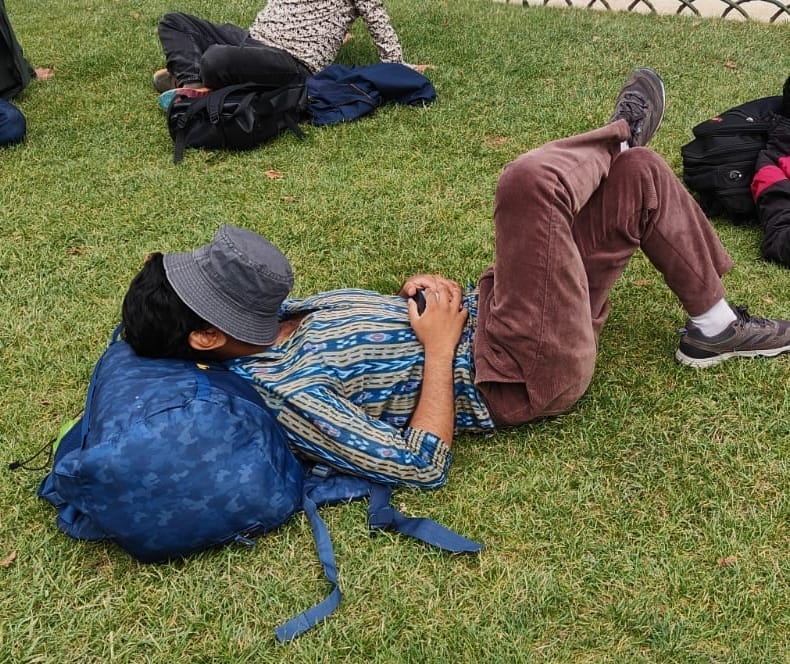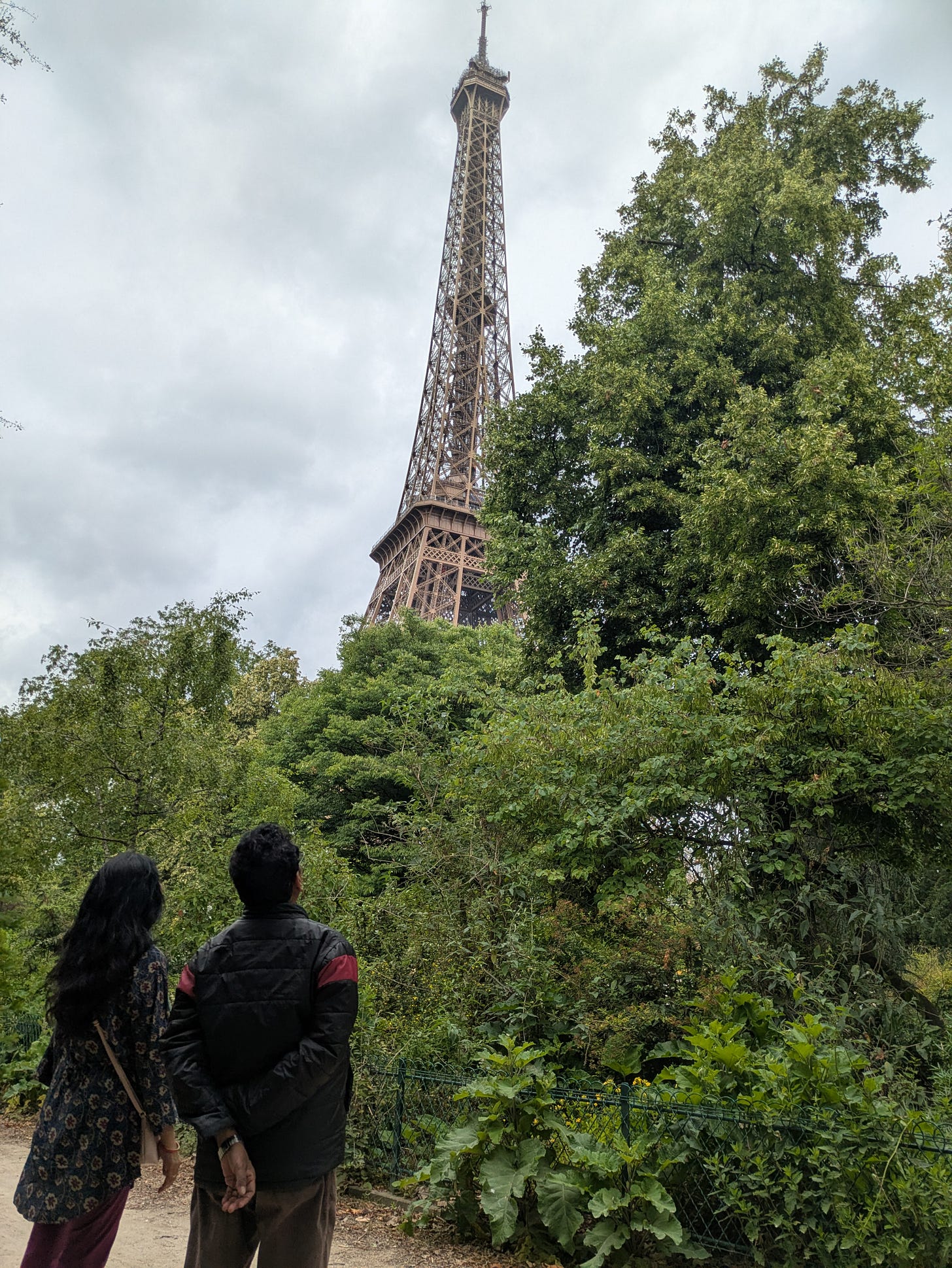What a privilege to complain about Paris
Paris used to feel like fiction, now I grumble about it.
I studied French in school, but it always felt like a distant language. Not just because it wasn’t mine, but because it belonged to a world I thought I’d never see. We learnt basic verbs, vocabulary about seasons and food. We’d perform little dialogues from the textbook. But no one was ever too serious about it. I enjoyed it, but I also treated it the way you treat anything foreign when you’re not sure if you’ll ever actually interact with it. Like learning facts about the moon.
Still, I used to daydream about going to Paris on a school trip. But even in my fantasies, I knew how far-fetched it was. I didn’t really imagine myself there, I imagined a heightened, fictional version of me, someone more fortunate, more global, more French somehow. Back then, any foreign country felt unreachable. Just the idea of boarding a flight, of navigating a place in another language, of figuring things out on my own, it felt enormous. I didn’t grow up thinking that was something I could realistically do.
In 2020, during the first few weeks of lockdown, I stumbled upon a French show called Dix pour cent. I hadn’t watched much French media before, and something about it, maybe the pacing, or the familiarity of actors playing fictional versions of themselves, hooked me.
I kept watching. And then rewatching. In the hopes of mastering the language, I developed an idea of Paris through that show. It gave me vocabulary that textbooks never taught (I still remember using the word chelou for the first time in a conversation, and the other person started laughing uncontrollably). I heard how people actually spoke: how quickly, how casually, how layered the language was. I’d replay scenes just to hear a phrase again, just to catch something I’d missed the first time. It made me want to speak French better, not just academically, but in a real, human way.
That was also the year I discovered Nathaniel Drew and Damon Dominique on YouTube. Two people who lived parts of their lives in French and talked openly about language learning and living abroad. Watching them made me feel like maybe these things weren’t as far away as I had imagined. Maybe people like me could indeed do this too. Nathaniel moved to Paris just before the pandemic. I remember watching his videos about adjusting to life there: his thoughts about routine, culture, solitude, and creativity. Damon spoke more about the language itself, and about feeling like an outsider and insider at the same time. Their perspectives stayed with me. They helped chip away at that fixed idea I had of what was possible for me.
Now it’s my fourth year living in Marseille. A sentence that still feels strange to write.
It didn’t happen overnight, of course. But looking back, the shift feels sudden. One day I was watching Parisians on TV; a few years later, I was buying groceries in the south of France. I live in a French city. I speak French every day. It’s my life now.
And Paris is just a train ride away.
I go there often, sometimes for friends, sometimes just because I want to feel a bit lost in a big city again. And almost every time, I complain before going. About how expensive it is. How crowded. How fast-paced. About the grey weather or how many stairs there are in the metro stations. It’s all true, in a way. But even while I’m complaining, I’m aware of the absurdity of it. I remember telling my French pen pal, just five years ago, that Paris wasn’t something I’d ever experience. It just didn’t seem like something that could happen. I said it as a fact, not with bitterness, just a kind of quiet acceptance.
And now, here I am, annoyed about train schedules to a city I once thought I’d never see.
Every now and then, I rewatch Dix pour cent. And the Paris I see in that show feels completely different from the Paris I visit now. It’s not that the show is inaccurate. It’s just that that Paris, the one on screen, belongs to the version of me who was watching from India. Who had never seen a French street sign in real life. Who still believed Paris was meant to be consumed from afar. That version of Paris had a kind of glow around it. It was stylised. It existed through camera angles and character arcs.
But the Paris I know now has no soft filters.
It’s walking out of Gare de Lyon to Bastille with a heavy suitcase because that specific metro line doesn’t work today. It’s the sound of the metro doors closing. It’s laughing with a new friend on the streets near Montparnasse, or rushing through rain in the 9th arrondissement because I misjudged the weather. It’s silent commutes. It’s corner boulangeries. It’s sitting in cafés alone and feeling entirely ordinary. And entirely okay.
Recently while I was complaining about the absolute maze that is the Châtelet metro station, a Parisian friend said, “It's okay, you know Paris now”.
I used to think Paris would always feel like someone else’s city.
But over time, it’s become layered with my own memories. And once that happens, once a city holds your footsteps, your mistakes, your coffee orders, your people, it changes. Or rather, you change in relation to it.
I no longer see the Eiffel Tower and think “how lucky.” I see it and think, “it’s still there.” That sounds ungrateful, but it’s not. It’s just... lived. Familiar. Mine.
I don’t think about what actors in Dix pour cent were doing on those streets. I think about walking with someone I’d just met, talking about nothing important and everything important all at once. I think of memories that didn’t make it to Instagram. The ones that felt too normal to capture, but too vivid to forget. Like that time when I absolutely had to pee while taking a stroll across the Seine so I begged the barista at a café to let me use the toilets. That’s the difference, I think, between imagining a place and living in it. The imagined place always feels larger, more cinematic. But the lived-in version? That one belongs to you in a way nothing imagined ever can.
I recently took my parents to Paris. I planned the trip. Booked the trains. Made a little itinerary. They loved it.
And as I watched them look around the city I now associate with grocery runs and metro apps, I saw a glimmer of what it once looked like to me too. Their awe reminded me that this isn’t normal. Not for everyone. Not even for the me from five years ago.
So yes, I complain. But I also know exactly what a gift it is to be able to.



